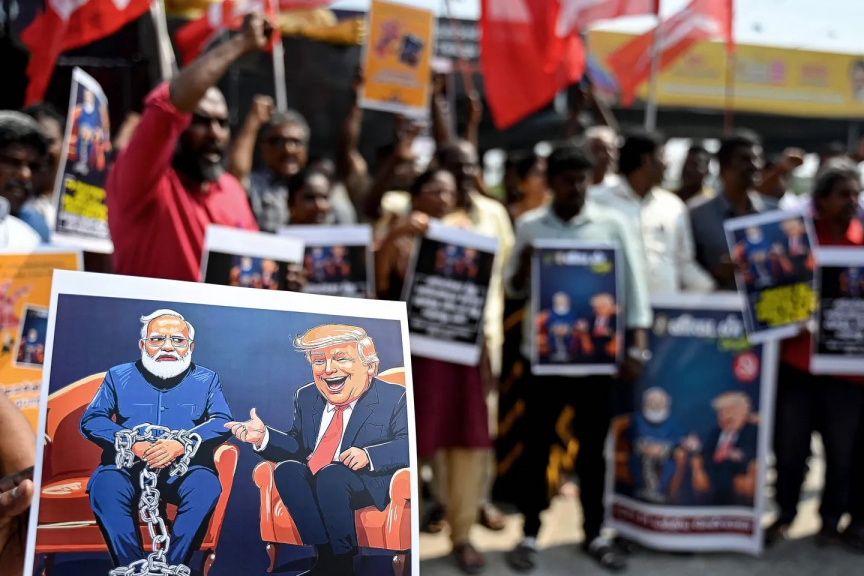
The United States has begun imposing a punitive 50 percent tariff on all Indian-origin goods, ramping up pressure on the Asian nation over its growing energy and defence ties with Russia. (Photo/AFP)
The United States has begun imposing a punitive 50 percent tariff on all Indian-origin goods, ramping up pressure on the Asian nation over its growing energy and defence ties with Russia, a country that US President says could face "economic war" if it doesn't make peace with Ukraine.
From Wednesday, Indian exports have been subjected to substantial US duties — among the highest imposed by Washington. This follows President Donald Trump's announcement of additional tariffs earlier in August, which he stated was in response to New Delhi's increased procurement of Russian oil and defence equipment.
The new duties apply to goods entering the US for consumption or withdrawn from warehouses for consumption from 12:01 am EDT on Wednesday or 9:31 pm IST, according to the Homeland Security notice.
The notification said exceptions would include in-transit shipments with proper certification, humanitarian aid, and items covered under reciprocal trade programmes.
The notification reiterated that the action was in response to India's indirect support of Russia's military incursion into Ukraine.
"The government has no hope for any immediate relief or delay in US tariffs," said a Commerce Ministry official, who spoke on condition of anonymity because they were not authorised to speak to media.
Private sector analysts' warning
Indian Prime Minister Narendra Modi has vowed not to compromise the interests of the country's farmers even if there is a heavy price to pay.
Modi is also taking steps to improve ties with China with his first visit in seven years planned for the end of the month.
Exporter groups estimate hikes could affect nearly 55 percent of India's $87 billion in merchandise exports to the US, while benefiting competitors such as Vietnam, Bangladesh and China.
"The US customers have already stopped new orders. With these additional tariffs, the exports could come down by 20-30 percent from September onward," said Pankaj Chadha, president, Engineering Exports Promotion Council.
Chadha added that the government has promised financial aid including increased subsidies on bank loans and support for diversification in the event of financial losses.
"However, the exporters see limited scope for diversifying to other markets or selling in the domestic market," he said.
Private sector analysts warn that a sustained 50 percent tariff could weigh on India's economy and corporate profits — prompting the steepest earnings downgrades in Asia — even if proposed domestic tax cuts partly cushion the blow.
Capital Economics said last week that if full US tariffs come into force, the hit to India's economic growth would be 0.8 percentage points both this year and next.
Bankrolling Russia's war?
Trump and his aides have accused India of bankrolling Russia's war in Ukraine.
A new tariff could hike rates on some Indian goods to 50 percent, potentially halting nearly $87 billion in US imports from India.
Recently, White House trade adviser Peter Navarro claimed that India's purchases of Russian crude were funding Moscow's war in Ukraine, adding that New Delhi was "now cozying up to both Russia and China."
"If India wants to be treated as a strategic partner of the US, it needs to start acting like one," Navarro wrote in an opinion piece published in the Financial Times on Monday with title "India’s oil lobby is funding Putin’s war machine — that has to stop".
"This surge has not been driven by domestic oil consumption needs. Rather, what really drives this trade is profiteering by India's Big Oil lobby," Navarro added. "In effect, India acts as a global clearinghouse for Russian oil, converting embargoed crude into high-value exports while giving Moscow the dollars it needs."
US Treasury Secretary Scott Bessent has also accused India of profiteering from its sharply increased purchases of Russian oil during the war in Ukraine, saying Washington viewed the situation as unacceptable.
Bessent told CNBC in a recent interview that Russian oil now accounted for 42 percent of India's total oil purchases, up from under 1 percent before the war, and contrasted that with longtime buyer China, whose Russian oil purchases had increased to 16 percent from 13 percent.
"India is just profiteering. They are reselling," Bessent said. "What I would call Indian arbitrage — buying cheap Russian oil, reselling it as product has just sprung up during the war — which is unacceptable," he said.
India says it is being unfairly targeted for buying discounted Russian oil, while the US and European Union continue to trade with Russia.
"Where the US is concerned, it continues to import from Russia uranium hexafluoride for its nuclear industry, palladium for its EV industry, fertilisers as well as chemicals," the Indian Foreign Ministry stated in a recent statement.
'Very serious' economic sanctions on Russia
Meanwhile, Trump said on Tuesday he is prepared to impose economic sanctions against Russia if its president, Vladimir Putin, fails to agree to a ceasefire in the war in Ukraine.
"It's very, very serious what I have in mind, if I have to do it, but I want to see it end," Trump told a reporter who asked if Putin would face consequences.
"We have economic sanctions. I'm talking about economic because we're not going to get into a world war."
The president has withheld long-threatened sanctions against Putin in his latest push to end the more than three-year-long war that has so far defied his efforts at mediation.
Trump is seeking one-on-one talks between Ukrainian President Volodymyr Zelenskyy and Putin.
Though Zelenskyy has agreed in principle to such talks, Putin has not.
The Kremlin has suggested no such meeting is currently on the cards.
"It will not be a world war, but it will be an economic war," Trump said at a White House Cabinet meeting.
"An economic war is going to be bad, and it's going to be bad for Russia, and I don't want that."
___
Source: TRT